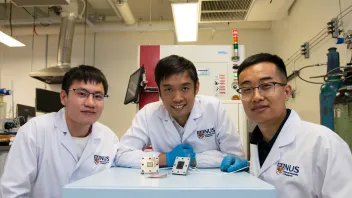greenhouse gases
New NUS technique efficiently transforms carbon into high-value chemicals
New NUS technique efficiently transforms carbon into high-value chemicals
This reduces the cost of conversion by 30%.
Singapore, Australia launch maritime decarbonisation plan
The plan accelerates the deployment of technologies that reduce greenhouse gases.
How digital transformation drives sustainability: The fast lane on the road to industrial carbon neutrality
Global warming risks are difficult to address because they are long-term in nature but require short-term action to reduce their impact. As a result, governments across the globe are now imposing targets on manufacturing industries that will force a transition to a low-carbon economy. Industrial organizations, according to the Environmental Protection Agency, are responsible for at least 21% of global greenhouse gas emissions. Therefore, they are under pressure from both consumers and governments to rapidly achieve emissions reduction targets. As a result, many companies are looking to digital transformation as a possible approach for achieving those goals.





 Advertise
Advertise
![Video [Event News]](https://cmg-qa.s3.ap-southeast-1.amazonaws.com/s3fs-public/styles/event_news_featured_article/public/2025-05/screenshot-2025-05-08-at-4.58.53-pm_0.png.webp?itok=Kud35sMs)
![Event News SBR 9 Lorem Ipsum [8 may]](https://cmg-qa.s3.ap-southeast-1.amazonaws.com/s3fs-public/styles/event_news_thumbnail/public/2025-05/a_hand_pointing_to_a_futuristic_technology_5b87c9d0e3_8.png.webp?itok=DTh_dbYp)
![Event News SBR 9 Lorem Ipsum [8 May]](https://cmg-qa.s3.ap-southeast-1.amazonaws.com/s3fs-public/styles/event_news_thumbnail/public/2025-05/a_hand_pointing_to_a_futuristic_technology_5b87c9d0e3_7.png.webp?itok=vzDAzb6V)
![Event News SBR 8 Lorem Ipsum [8 May]](https://cmg-qa.s3.ap-southeast-1.amazonaws.com/s3fs-public/styles/event_news_thumbnail/public/2025-05/a_hand_pointing_to_a_futuristic_technology_5b87c9d0e3_6.png.webp?itok=jvHFc4P6)
![Video [Event News]](https://cmg-qa.s3.ap-southeast-1.amazonaws.com/s3fs-public/styles/video_thumbnail/public/2025-05/screenshot-2025-05-08-at-4.58.53-pm_0.png.webp?itok=yZnI0YBb)
![Video 1 SBR [8 May]](https://cmg-qa.s3.ap-southeast-1.amazonaws.com/s3fs-public/styles/video_thumbnail/public/2025-05/screenshot-2025-05-08-at-4.58.53-pm.png.webp?itok=9AAeRz_k)

